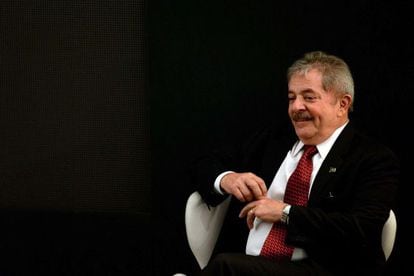"The only way to avoid an investigation in this country is not to make errors"
Former Brazilian president Luis Inácio Lula da Silva speaks of his plans since beating cancer

Doña Lindu didn't know that "Lula" meant squid in Portuguese. But with the passage of time maybe that wasn't such a bad nickname after all for her seventh child, Luis Inácio Lula da Silva. Having once worked as a lathe operator, he demonstrated that the upper echelons of Brazilian politics weren't just for the country's elite. In fact, he demonstrated that it was much better to cut your teeth on the streets: he started off as a shoeshine boy and rose through the labor movement to become a powerful union leader. And in between, during the dictatorship, he was jailed.
Lula da Silva wanted to break old prejudices that said he was going to be unable to govern a country gripped by poverty, plagued with bureaucracy and, to a certain extent, looked down on by the international community.
Not many leaders today can say they broke spiraling poverty for 40 million of their citizens, while at the same time consolidating sustained growth for their country.
After successfully battling throat cancer, Lula da Silva has no intention of returning to politics. He served two terms from 2003 to 2010 and is now planning to support his successor, Dilma Rousseff, as she runs for a second term. But he isn't standing in the shadows. The 67-year-old Lula da Silva wants to continue to help make much-needed changes in his country.
Society has discovered that it is possible to aspire to higher levels
Question. After beating cancer, it appears you are ready to go back to the frontline.
Answer. No, no, no. I only want to survive. Time has passed since I had surgery and thank God I have recovered, but I am working harder now than when I was president.
Q. You shouldn't say that, just in case they drag you back in.
A. No, what I really want to do is contribute to the development of Latin America and Africa through my institute using the successful methods we applied in Brazil. Because you can take care of the poor without it costing much. If you give them access to resources, they become consumers, and from there industry takes off, jobs are created, salaries become competitive, and that is how you form this virtuous circle where production goes up, consumers consume, and they begin to study and have access to culture.
Q. But this virtuous circle has left today's youth in Brazil unhappy. Is that the root of the protests?
A. This is a very important issue, and we are giving it a lot of value. These protests are healthy. By 2016 Brazil will become the world's fifth-largest economy and it has produced a society that wants more. This is normal. Society has discovered that it is possible to aspire to higher levels. We need to push for more participation in the democratic process and not allow our youth to repudiate politics because if that happens, there will be a rise of fascism. We want the young generation to openly discuss issues so that they realize that without them there is no future.
Q. What is clear is that Dilma Rousseff has understood the shouts coming from the streets, and has been sensitive to these cries, but at the same time you have criticized certain actions by party members. Do they know how to handle the situation?
A. The Workers' Party (PT) just turned 33 years old. When you arrive at that point, those of us who joined when we were 35 years old must step aside to allow a new generation through.
Q. Can you compare political parties to human beings? Do they deteriorate in the same fashion?
A. I tell my colleagues that the only way to avoid an investigation in this country is not to make any errors. I doubt there is a country in the world that has more inspections and oversight than Brazil. Of all the complaints, 90 percent are filed by the government. The more transparency, the better. But we cannot allow someone to be put on trial and then acquitted without there being public apologies afterward. That is why I am concerned about these a priori convictions. In the PT corruption case, there were party members who had already been convicted in the media and even handed down life sentences. Some are afraid to go out on the streets. I insist that we must be 150-percent right because if we are wrong, even by one percent, our adversaries and the media will take us to task 1,000 percent.











































